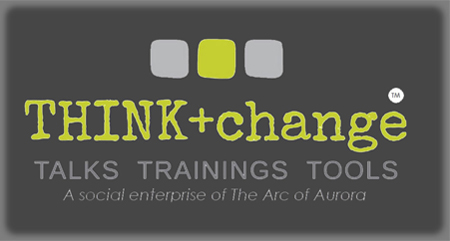 The five-part Disability in Society Educational Series microlearning video training begins with Citizen, not just consumer. We all belong to communities and as a member – a citizen — of a community, we are part of something bigger than ourselves. Consumerism implies consumption without responsibility or relationship. People with disabilities want to and should be recognized and included as citizens. The series continues with Hiring people with disabilities is just good business. People with disabilities are reliable employees and have an overall higher job retention rate. Businesses that embrace disability inclusion have found … a positive correlation between … profitability, employee morale, and engagement. The series continues with segments on paying taxes, Medicaid, and transportation.
The five-part Disability in Society Educational Series microlearning video training begins with Citizen, not just consumer. We all belong to communities and as a member – a citizen — of a community, we are part of something bigger than ourselves. Consumerism implies consumption without responsibility or relationship. People with disabilities want to and should be recognized and included as citizens. The series continues with Hiring people with disabilities is just good business. People with disabilities are reliable employees and have an overall higher job retention rate. Businesses that embrace disability inclusion have found … a positive correlation between … profitability, employee morale, and engagement. The series continues with segments on paying taxes, Medicaid, and transportation.
Citizen, not just consumer: We all belong to communities, and as a member – a citizen — of a community, we are part of something bigger than ourselves. Consumerism implies consumption without responsibility or relationship. People with disabilities want to and should be recognized and included as citizens.
Hiring people with disabilities: People with disabilities are reliable employees and have an overall higher job retention rate. Businesses that embrace disability inclusion have found … a positive correlation between … profitability, employee morale, and engagement.
Paying Taxes: Tax revenues provide for what citizens need and could not be done solely by one person, such as building and maintaining roads or providing curb cuts for wheelchairs. Paying taxes implies opportunity: opportunity to purchase (sales tax), to own (property tax), or to work (income tax).
Medicaid matters: Medicaid is the largest source of federal funds to states, and it fuels economic activity. For example, Medicaid pays salaries for caregivers to provide long-term care for aging adults and long-term care for adults with disabilities in, for instance, individuals homes and group homes.
Transit: Transportation is more than a system of moving people and things. Accessible public transit options not only accommodate passengers with disabilities but also offer benefits to other users. When the nation supports what is needed most by people with disabilities – as with transportation accommodations — everyone benefits.
